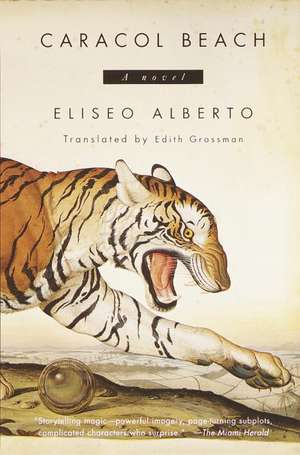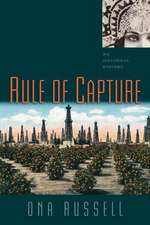Caracol Beach
Autor Eliseo Alberto Traducere de Edith Grossmanen Limba Engleză Paperback – 31 oct 2001
Beto Milanes, the night watchman at a graveyard in the Florida resort town of Caracol Beach, is a guilt-ridden Cuban war veteran. Tormented by memories and hallucinations, he yearns to die but is unable to take his own life. Instead, he decides to force someone-anyone-to kill him. That decision sets in motion a night of violence that draws an odd assortment of characters into Beto's orbit. In scenes that range from the jungles of Angola to a seedy Florida bar, Alberto explores war, madness, exile, and the redemptive power of love.
Translated by Edith Grossman.
Preț: 187.50 lei
Nou
Puncte Express: 281
Preț estimativ în valută:
35.88€ • 37.46$ • 29.63£
35.88€ • 37.46$ • 29.63£
Carte tipărită la comandă
Livrare economică 11-17 aprilie
Preluare comenzi: 021 569.72.76
Specificații
ISBN-13: 9780375705069
ISBN-10: 0375705066
Pagini: 304
Dimensiuni: 132 x 204 x 18 mm
Greutate: 0.25 kg
Editura: Vintage Publishing
ISBN-10: 0375705066
Pagini: 304
Dimensiuni: 132 x 204 x 18 mm
Greutate: 0.25 kg
Editura: Vintage Publishing
Notă biografică
Eliseo Alberto is a poet, journalist, and filmmaker. He lives in Mexico City.
Extras
Chapter One
Clemency isn't a word that is used very often. On the previous night the soldier had dreamed again about the Bengal tiger, and he woke with a start, the taste of rotting meat in his mouth. He spat blood. His nerves had destroyed his gums, and no matter how much he rinsed his mouth with bicarbonate of soda, and even though he drank a thousand cups of coffee and smoked a thousand unfiltered Camels, the acid of the infection kept draining, drop by drop. He dressed under the blanket. Ever since his cavalry during the war in Ibond? de Ak?, eighteen years earlier, he had taken the precaution of sleeping with his boots on, a habit that eventually devastated his feet with raging fungus infections. He tried to take refuge in a happy memory and escape the trap that way. He failed. Through narrowed eyes he saw the tiger come in. A tiger. The tiger. That one. The yellow one. From Bengal. Its presence took his breath away. It would appear without warning in a derangement of dreams and then give him no peace. Before he caught sight of it under the table, toying with a rat from the garbage dump, he had smelled its rank poppy-cream scent, like a whore's perfume floating in the dawn air, and he woke in anguish. He heard the distant crowing of early morning roosters, the motors of cars driving along the highway, the sound of an ocean he knew was too far away, but only when he saw a ring of seven blowflies resting on the ceiling lightbulb did a snapping twig tell him the devil was near. The flies were startled and stirred the air with the windmill vanes of their wings. Each time he had the nightmare the compass of his mind switched poles and led him down blind alleys. The tiger was slavering. It was thirsty. Or maybe hungry. The rat wasn't enough. It wanted another one. It wanted him.
"Virgin of Regla! In the name of all you hold dear, tell it to go away! Let there be Light and Progress for you," he pleaded. His prayer crashed into the hills. The echo rebounded through the swirling mist.
Since taking the job as night watchman at the auto salvage yard in Caracol Beach, he had lived in a trailer that had once been a circus wagon. The name could still be read in an arc of showy calligraphy that was faded and weathered: five star show. traveling rodeo. performers and gypsy fortunetellers. trained animals. private dressing-rooms. The sides were painted with images of lions, bearded ladies, and trapeze artists. The interior of the car was equipped with everything needed to make it a habitable prison: the cot attached with hinges to the back wall, a two-burner hot plate to cook on, and a tiny bathroom that barely held one person but had the functional design of a sleeping compartment on a train, with all the fixtures in easy reach -- sitting on the toilet you could comfortably turn the tap and take a shower without having to get up. The string of red, blue, and yellow lights that outlined the trailer on all four sides was the one luxury the solitary tenant allowed himself to keep in perfect working order. He liked to turn on the lighting system and see his tin-plate vessel from the highway, shining in the middle of that graveyard for demolished cars.
When he went outside, dazed by the echoes of his dream, the tiger was pacing the roof of the trailer. In the light of dawn he noticed the remarkable fact that the animal had wings harmoniously joined to its body. Wings of a swan or an angel. Two fans of white, silky, well-groomed feathers. It had come from a place where it had been raining because drops of water glistened like pellets of mercury on the edges of its feathers. It was something to see. The tiger sprang with ease from the roof to the clouds, and from cloud to cloud, treading lightly through the field of cumulus, and from there, not moving its wings, dropped in a pronounced curve into the auto salvage yard and was lost from view among the heaps of twisted metal. A beautiful sight. The soldier lit a cigarette and the tobacco tasted like cyanide. "Strike, Strike Two! Where are you, you son of a bitch?" he shouted.
Strike Two appeared at the window of the Oldsmobile. The game of hide-and-seek was repeated with theatrical punctuality. First he showed his pointed ears, then his eyes, his snout, his tongue, his neck, until half his body was visible and he publicly assumed the pose of a great mastiff. He was a puppy. A stray. A troublemaker. He had come to the yard last Christmas and for several days chose to sleep outdoors, under the cars. The soldier did not do much to get close to him, either. They felt a mutual distrust. Sometimes the puppy barked when a customer came in, taking on the sentinel's role that no one had assigned him. He spent his time chasing unreachable butterflies along the alleyways of the graveyard, or biting his own tail in comical whirlwinds. He drank his water from puddles. Neither of them relented. They were stubborn. Very stubborn. But on the night of December 31 the animal came into the trailer and jumped at the soldier's legs just as he was about to slit his veins with a bayonet blade. The dog's incursion prevented his suicide. The soldier gave him a name that reminded him of his days as a baseball player: Strike Two. The soldier was Strike One. On New Year's Day the dog began to sleep in the Oldsmobile, a monstrosity built from parts and pieces of other vehicles, like a mechanical Frankenstein. Every morning the man and his dog repeated the game of hide-and-seek. The man had to pretend he was looking for him in the yard. "Strike, Strike Two! Where are you, you son of a bitch?" After three or four shouts the puppy, with studied complicity, would begin to show his ears, eyes, snout, tongue, and neck. But on that rainy Saturday the soldier greeted him with a kick. Strike crossed the graveyard with his belly to the ground and reached the highway, determined to leave. He stopped on the shoulder. He was panting. He began to look around. Droves of carnivorous trucks, packs of ravening cars, herds of wild buses, stampedes of ferocious vehicles raced along the asphalt track. Strike went back to the graveyard and dropped onto the steps of the trailer. In the human jungle some roads are impassable.
Recenzii
"A spectacular read... Storytelling magic."
--The Miami Herald
"Magic realism is in flower, but beneath its extravagant exaggerations lie serious observations about human nature."
--The New York Times Book Review
"[B]rilliant... a modern tragedy where madness goes hand in hand with the absurd."
--El Pais
--The Miami Herald
"Magic realism is in flower, but beneath its extravagant exaggerations lie serious observations about human nature."
--The New York Times Book Review
"[B]rilliant... a modern tragedy where madness goes hand in hand with the absurd."
--El Pais









